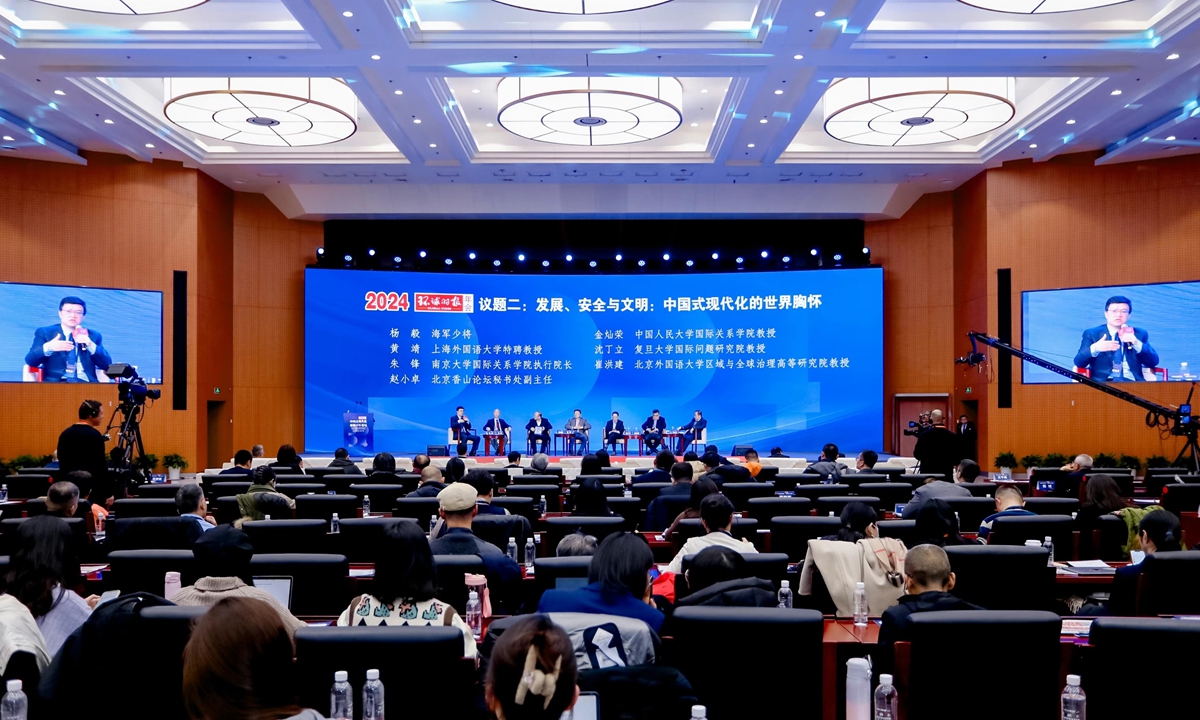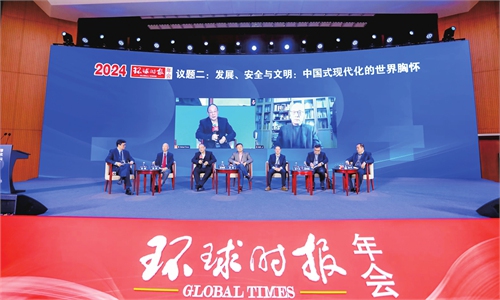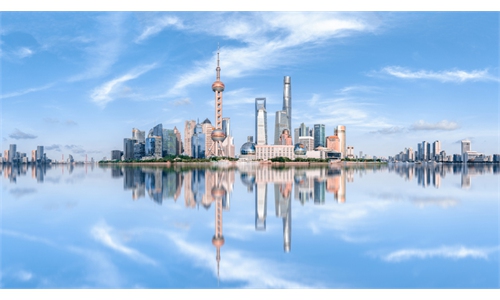
The 2024 Global Times Annual Conference is held in Beijing on Saturday. Photo: GT
Editor's Note:The 2024 Global Times Annual Conference, themed "Following the Path of Chinese Modernization, Coping with Changes Unseen in a Century" was held in Beijing on Saturday. To understand the implications of Chinese modernization in this turbulent world and analyze what China can do to stay on this path and overcome various challenges in 2024, the Conference invited over 100 representatives from all walks of life as well as experts and scholars to share their views on four major themes. The following contains excerpts from the second theme - "Development, security and civilization: the global vision of Chinese modernization."
Chinese modernization carries global significance
Jin Canrong, professor of the School of International Studies at the Renmin University of China:
Modernization began in the West; however, after centuries of industrialization, the success rate of modernization for non-Western countries remains low. Given this background, Chinese modernization carries global significance. When studying development economics, I had a feeling that the development theories of developed Western countries, which became the first to climb the ladder of industrialization and achieve modernization, actually played a role in hindering other countries' development. From this perspective, it is even more important for us to promote and achieve Chinese modernization. Only by successfully achieving this goal can we create a new path for modernization exploration for non-Western countries and regions.
Huang Jing, professor at Shanghai International Studies University:
Development, security, and civilization - these perspectives themselves reflect the global vision of Chinese modernization. From China's perspective, the international order is supported by three pillars: the international political order centered around the UN, the world economic and trade order centered around the World Trade Organization and other international economic and trade organizations, as well as the world financial order centered around the World Bank and the International Monetary Fund. The foundation of these three orders is multilateral mechanisms rather than unilateral mechanisms. Therefore, China firmly adheres to multilateralism in diplomacy, which is promoting the improvement of the international order based on multilateral mechanisms.
Chinese modernization is embedded with a peaceful gene
Zhao Xiaozhuo, deputy director of the Beijing Xiangshan Forum Secretariat:
One of the characteristics of Chinese modernization is to walk on the path of peaceful development. China's culture emphasizes that peace is precious and that harmony brings wealth. Peace is also in line with the best interest of China, and one of the reasons for the great development achievements since the reform and opening-up is that we have seized the opportunity of such a long period of peace.
Regarding the relationship between Chinese modernization and peace, first, China is a defender and builder of peace in the region and the world. At present, wars are raging from Europe to the Middle East and Africa, but the Asia-Pacific region has enjoyed decades of peaceful and prosperous development, in which China has undoubtedly played a significant role.
Second, China is a provider of international public security products. China has always been an active participant in United Nations peacekeeping and escort operations and is the second-largest contributor to the UN's regular budget and peacekeeping assessments. In the event of natural disasters in its neighborhood, China has always tried its best to deliver aid and rescue. The activities of the Chinese military, especially overseas, have never overridden the UN framework, but have always been based on UN mandates or resolutions.
Third, China is gradually becoming a mediator in international security hotspots. This is a demand that has arisen naturally in the international community after China's power reached a certain level. The 9th Beijing Xiangshan Forum this year is a case in point, reflecting the international community's call for peace and its desire for China to play a greater role in international hotspots.
Yang Yi, Chinese People's Liberation Army (PLA) Navy rear admiral:
China's development requires a peaceful, stable and secure world, and the world's development also needs a continuously modernizing China. China's Global Development Initiative (GDI), Global Security Initiative (GSI) and Global Civilization Initiative (GCI) can be understood as an international strategic path system of Chinese modernization.
China has always adhered to the path of peaceful development, but Western countries, led by the US, traditionally achieved modernization through external expansion and colonial plunder. They believe that China will inevitably follow the beaten track of big powers in seeking hegemony. In this situation, China needs to formulate the correct strategy and take the correct measures while continuously enhancing its comprehensive strength, including military strength.
In the current international environment, China faces many challenges, among which the most sensitive one is the Taiwan question. As China has repeatedly affirmed its firm position on the Taiwan question, coupled with the conflicts between Russia and Ukraine, and between Israel and Palestine, the US-led Western camp is cautious about taking bold actions on the Taiwan question and has shifted its focus to the South China Sea. The South China Sea has become a new hotspot, especially when the West uses the Philippines as a pawn to continually provoke China.
China advocates for peaceful development and fairness in the world, while the US insists on the "law of the jungle" and seeks to continue to "dominate" the world. We must both counter the US containment efforts against China and prevent conflicts, especially large-scale military confrontations. When dealing with the US, China must strive for the best results while also being prepared for the worst scenario. By being fully prepared we can better protect our national interests.
Huang: The relationship between China and the US has a decisive impact on the world landscape. Whether in terms of politics, economy, military, culture, social system or on the ideological level, the US believes that China has the power to compete with it.
The US has made significant efforts in economic competition with China. The "de-globalization" promoted by the US is actually "de-Sinicization," and the "small yard, high fence" is essentially about "decoupling" from China. Driven by Cold War thinking, the US wants to engage in confrontation with China which is essentially a "zero-sum game." However, trade and economic cooperation have a nature of being a "positive-sum game." The US is now attempting to reverse the "positive-sum game" of trade and economic cooperation with China to a security-oriented "zero-sum game."
In this regard, China has a broader perspective than the US. Politically, it does not export its own ideology or impose its own model on others. Economically, China, as the world's largest trading nation, actively promotes globalization because it recognizes that it can only develop in a world with closer cooperation. Militarily, China seeks cooperation and development based on common interests, equality and mutual benefits in an inclusive and open manner. In contrast, the ultimate goal of US alliances is confrontation based on ideology. Relationships within alliances are also unequal with the US always being the leader in the alliances it has established.
Advancing stably and firmly the path to Chinese modernization
Zhu Feng, director of the Institute of International Studies at Nanjing University:
We are at a critical point where Chinese modernization is climbing over a hurdle, because in the near future, the global balance of power will remain in the current pattern of "the West is strong and the East is weak" despite a trend of "rising East and declining West." Thus, we need to promote China's scientific and technological innovation, the strength in high-end manufacturing and overall international competitiveness to reach a new historical peak. Promoting reform and opening-up to move forward continuously is a decisive step for Chinese modernization to serve both the great rejuvenation of the Chinese nation and contribute to world peace, development and prosperity.
Shen Dingli, professor from Fudan University's Institute of International Studies:
On the basis of the lessons learned from the past, especially in light of the new experiences since the reform and opening-up, we propose to build Chinese modernization. Chinese modernization is a part of global modernization and plays a role in improving global modernization in a certain sense. China's GDI, GSI and GCI also show that we can create a theoretical system applicable to the world by sorting out our own value and legal system as well as development experience. In order to promote the construction of Chinese modernization, we still need to do our own things well and make greater efforts.
Cui Hongjian, professor of the Academy of Regional and Global Governance with Beijing Foreign Studies University:
Amid the emergence of multipolarity and the continued advancement of Chinese modernization, we are entering a new era in which the world pattern and international order will have more conditions and are more likely to move toward greater equality and democracy. In this regard, we should have more confidence in the future benign evolution in the international landscape on the basis of economic globalization.


